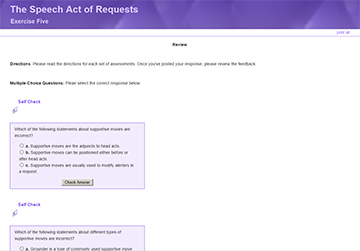Unit 5: Supportive Moves
Unit 5 explicitly instructs students four types of supportive moves that are commonly used in Chinese requests and provides students with corresponding exercises and activities for practice.
5.1 Goal of Unit 5
The goal of Unit 5 is to familiarize students with four types of supportive moves that are commonly used in Chinese. After studying this unit, students will be able to understand the function of supportive moves in Chinese requests and to identify different types of supportive moves in request expressions.
5.2 Supportive Moves (1)
Supportive moves are the adjuncts to the head act, used to modify the impact or force of requests. They can be put either before (pre-supportive moves) or after the head act (post-supportive moves). Chinese speakers have their preferences for the choice of supportive moves, and this section presents some supportive moves commonly used to make requests in Chinese.
Grounder
The Grounder, a type of supportive move commonly used in both English and Chinese requests, is the reasons, explanations, or justifications that the speaker gives for his/her request, which may either precede or follow the head act. However, generally speaking, Chinese speakers tend to give explanations before making a request. In other words, the grounder is positioned more often as the pre-supportive move in Chinese requests. For example,
我昨天没来上课,想借你的笔记看看。Wǒ zuótiān méi lái shàngkè, xiǎng jiè nǐ de bǐjì kànkan.
I missed the class yesterday. I want to borrow your notes to have a look.
Preparator
This supportive move is also commonly used in both English and Chinese requests. The speaker prepares his/her hearer for the subsequent requests by announcing that he/she will make a request or by checking the potential availability of the hearer for carrying out the request. For example,
我有一件事情想问你,你能明天上午来学校吗?
Wǒ yǒu yí jiàn shìqing xiǎng wèn nǐ, nǐ néng míngtiān shàngwu lái xuéxiào ma?
I have something to ask you. Can you come to school tomorrow morning?
你明天有空吗?可以和我一起去图书馆吗?
Nǐ míngtiān yǒukòng ma? Kěyǐ hé wǒ yìqǐ qù túshūguǎn ma?
Are you free tomorrow? Would you be able to go to the library with me?
To learn more about the Chinese words and expressions in this section, please refer to the Glossary below.
| Word | Pinyin | Part of speech | English translations |
| 昨天 | zuótiān | noun | Yesterday |
| 没 | méi | adv. | Not |
| 上课 | shàngkè | N/A | To attend class |
| 笔记 | bǐjì | noun | Notes |
| 有 | yǒu | verb | To have; possess |
| 事情 | shìqing | noun | Affair; matter; thing |
| 上午 | shàngwǔ | noun | Morning |
| 学校 | xuéxiào | noun | School |
| 和 | hé | conj. | And; with |
| 一起 | yìqǐ | adv. | Together |
| 图书馆 | túshūguǎn | noun | Library |
5.3 Supportive Moves (2)
In addition to Grounder and Preparator, Thanking and Promise of Reward are also commonly used to modify the force of requests in Chinese. They usually serve as post-supportive moves in Chinese requests.
Thanking
When making requests in Chinese, speakers often express gratitude to the hearer for the expected acceptance of the request. This type of supportive move usually comes after the head act and is preferable to Chinese speakers. For example,
能给我们照张相吗?谢谢你了!
Néng gěi wǒmen zhào zhāng xiàng ma? xièxiè nǐ le.
Can you take a photo of us? Thank you.
Promise of Reward
To increase the possibility of the hearer’s acceptance of the request, Chinese speakers often promise to the hearer beforehand. Similar to the supportive move of thanking mentioned above, the promise of reward is often put after the head act. For example,
可以把书借给我吗?我明天就还(huán, return; give back) 给你。
Kě yǐ bǎ shū jiè gěi wǒ ma? Wǒ míngtiān jiù huán gěi nǐ.
Could you lend me your book? I will return it to you tomorrow.
Last but not least, Chinese speakers often use different combinations of supportive moves to increase the likelihood of the hearer’s acceptance of the request. For example,

I missed the class yesterday. Could you lend me your notes? I will return them to you tomorrow. Thanks very much.
Thinking: Are these two types of supportive moves, i.e., thanking and promise of reward, commonly used in American English? If yes, any examples you can think of or find in your everyday communication?
Review
To review the above contents, please click the Exercise Five link.
